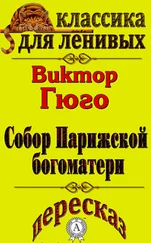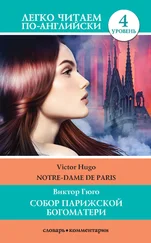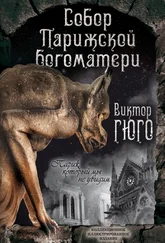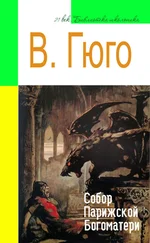| On the bare flagstones which formed the floor, in one corner, a woman was sitting, or rather, crouching. |
На голой плите, служившей полом, в углу, скорчившись, сидела женщина. |
| Her chin rested on her knees, which her crossed arms pressed forcibly to her breast. |
Подбородок ее упирался в колени, прижатые к груди скрещенными руками. |
| Thus doubled up, clad in a brown sack, which enveloped her entirely in large folds, her long, gray hair pulled over in front, falling over her face and along her legs nearly to her feet, she presented, at the first glance, only a strange form outlined against the dark background of the cell, a sort of dusky triangle, which the ray of daylight falling through the opening, cut roughly into two shades, the one sombre, the other illuminated. |
На первый взгляд это сжавшееся в комок существо, утонувшее в широких складках коричневого вретища, с длинными седыми волосами, которые свисали на лицо и падали вдоль ног до самых ступней, казалось каким-то странным предметом, чернеющим на сумрачном фоне кельи, каким-то подобием темного треугольника, четко разделенного падающим из оконца лучом света на две половины - одну темную, другую светлую. |
| It was one of those spectres, half light, half shadow, such as one beholds in dreams and in the extraordinary work of Goya, pale, motionless, sinister, crouching over a tomb, or leaning against the grating of a prison cell. |
Это был один из тех призраков, наполовину погруженных во мрак, наполовину залитых светом, которых видишь либо во сне, либо на причудливых полотнах Гойи, - бледных, недвижных, зловещих, присевших на чьей-нибудь могиле или прислонившихся к решетке темницы. |
| It was neither a woman, nor a man, nor a living being, nor a definite form; it was a figure, a sort of vision, in which the real and the fantastic intersected each other, like darkness and day. |
Создание это не походило ни на женщину, ни на мужчину, ни на какое живое существо: это был набросок человека, нечто вроде видения, в котором действительность сливалась с фантастикой, как свет сливается с тьмой. |
| It was with difficulty that one distinguished, beneath her hair which spread to the ground, a gaunt and severe profile; her dress barely allowed the extremity of a bare foot to escape, which contracted on the hard, cold pavement. |
Сквозь ниспадавшие до полу волосы с трудом можно было различить изможденный суровый профиль; из-под платья чуть виднелся кончик босой ноги, скрюченной на жестком ледяном полу. |
| The little of human form of which one caught a sight beneath this envelope of mourning, caused a shudder. |
Человеческий облик, смутно проступавший сквозь эту скорбную оболочку, вызывал в зрителе содрогание. |
| That figure, which one might have supposed to be riveted to the flagstones, appeared to possess neither movement, nor thought, nor breath. |
Этой фигуре, словно вросшей в каменную плиту, казалось, были чужды движение, мысль, дыхание. |
| Lying, in January, in that thin, linen sack, lying on a granite floor, without fire, in the gloom of a cell whose oblique air-hole allowed only the cold breeze, but never the sun, to enter from without, she did not appear to suffer or even to think. |
Прикрытая в январский холод лишь тонкой холщовой рубахой, на голом гранитном полу, без огня, в полумраке темницы, косое оконце которой пропускало лишь стужу, но не давало доступа солнцу, она, по-видимому, не только не страдала, но вообще ничего не ощущала. |
| One would have said that she had turned to stone with the cell, ice with the season. |
Она стала каменной, как ее келья, и ледяной, как зима. |
| Her hands were clasped, her eyes fixed. |
Руки ее были скрещены, взгляд устремлен в одну точку. |
| At first sight one took her for a spectre; at the second, for a statue. |
В первую минуту ее можно было принять за призрак, вглядевшись пристальнее - за статую. |
| Nevertheless, at intervals, her blue lips half opened to admit a breath, and trembled, but as dead and as mechanical as the leaves which the wind sweeps aside. |
И все же ее посиневшие губы время от времени приоткрывались от вздоха, но движение их было столь же безжизненным, столь же бесстрастным, как трепетанье листьев на ветру. |
| Nevertheless, from her dull eyes there escaped a look, an ineffable look, a profound, lugubrious, imperturbable look, incessantly fixed upon a corner of the cell which could not be seen from without; a gaze which seemed to fix all the sombre thoughts of that soul in distress upon some mysterious object. |
И все же в ее потускневших глазах порой зажигался взгляд, неизъяснимый, проникновенный, скорбный, прикованный к невидимому снаружи углу кельи, - взгляд, который, казалось, устанавливал связь между мрачными мыслями этой страждущей души и какимто таинственным предметом. |
| Such was the creature who had received, from her habitation, the name of the "recluse"; and, from her garment, the name of "the sacked nun." |
Таково было это существо, прозванное за обиталище "затворницей", а за одежду -"вретишницей". |
| The three women, for Gervaise had rejoined Mahiette and Oudarde, gazed through the window. |
Все три женщины - Жервеза тоже присоединилась к Майетте и Ударде смотрели в оконце. |
| Their heads intercepted the feeble light in the cell, without the wretched being whom they thus deprived of it seeming to pay any attention to them. |
Несчастная не замечала их, хотя их головы, заслоняя окно, лишали ее и без того скудного дневного света. |
| "Do not let us trouble her," said Oudarde, in a low voice, "she is in her ecstasy; she is praying." |
- Не будем ее тревожить, - шепотом проговорила Ударда, - она молится. |
| Meanwhile, Mahiette was gazing with ever-increasing anxiety at that wan, withered, dishevelled head, and her eyes filled with tears. |
Между тем Майетта с возраставшим волнением всматривалась в эту безобразную, поблекшую, растрепанную голову. |
| "This is very singular," she murmured. |
- Как странно! - бормотала она. |
| She thrust her head through the bars, and succeeded in casting a glance at the corner where the gaze of the unhappy woman was immovably riveted. |
Просунув голову сквозь решетку, она ухитрилась заглянуть в тот угол, к которому был прикован взор несчастной. |
| When she withdrew her head from the window, her countenance was inundated with tears. |
Когда Майетта оторвалась от окна, все лицо у нее было в слезах. |
| "What do you call that woman?" she asked Oudarde. |
- Как зовут эту женщину? - спросила она Ударду. |
| Oudarde replied,- "We call her Sister Gudule." |
- Мы зовем ее сестрой Гудулой, - ответила Ударда. |
| "And I," returned Mahiette, "call her Paquette la Chantefleurie." |
- А я назову ее Пакеттой Шантфлери, - сказала Майетта. |
| Then, laying her finger on her lips, she motioned to the astounded Oudarde to thrust her head through the window and look. |
Приложив палец к губам, она предложила Ударде просунуть голову в оконце и заглянуть внутрь. |
| Oudarde looked and beheld, in the corner where the eyes of the recluse were fixed in that sombre ecstasy, a tiny shoe of pink satin, embroidered with a thousand fanciful designs in gold and silver. |
Ударда заглянула в тот угол, куда был неотступно устремлен горевший мрачным восторгом взор затворницы, и увидала розовый шелковый башмачок, расшитый золотыми и серебряными блестками. |
| Gervaise looked after Oudarde, and then the three women, gazing upon the unhappy mother, began to weep. |
Вслед за Удардой заглянула в келью и Жервеза, и все три женщины расплакались при виде несчастной матери. |

![Виктор Гюго - Собор Парижской Богоматери [Notre-Dame de Paris]](/books/30985/viktor-gyugo-sobor-parizhskoj-bogomateri-notre-thumb.webp)
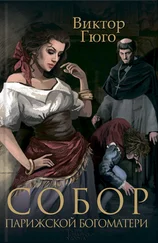
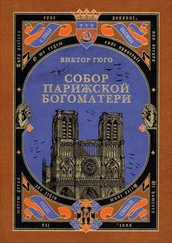
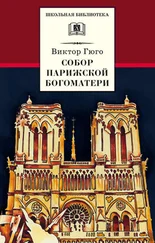
![Виктор Гюго - Собор Парижской Богоматери. Париж [сборник]](/books/398980/viktor-gyugo-sobor-parizhskoj-bogomateri-parizh-sbo-thumb.webp)
